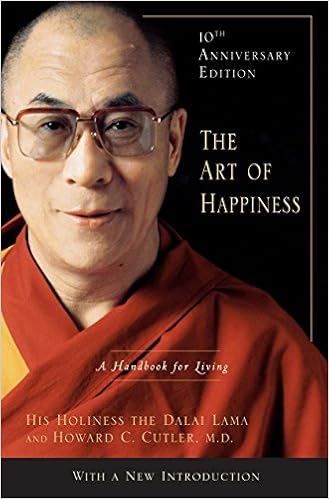The 14th Dalai Lama was born Lhamo Döndrub, the 5th child of a large family in the farming village of Qinghai, China. At the age of two, he was picked out as the rebirth of the thirteenth Dalai Lama and sent for formal monastic training to become a Buddhist monk and eventually become the spiritual head of the Tibetan people. His spiritual name is Tenzin Gyatso, though he is mostly referred to as the ‘Dalai Lama’
“My religion is very simple. My religion is kindness.”
– Dalai Lama
He was formally enthroned as the Dalai Lama in 1950, shortly after the Chinese invasion of Tibet. He was thrust into a position of immense significance becoming both spiritual and political leader to a country under invasion and occupation.

The Dalai Lama has followed a long campaign of non-violent resistance to the Chinese occupation. He has frequently called on the Chinese to respect the basic human rights of the indigenous Tibetans and end the migration of the ethnic Han Chinese into Tibet. In 1987 he proposed a five-point peace plan about the future of Tibet and called Tibet to be made into a zone of peace. He also secured United Nations resolutions to support the right for Tibetan self-determination.
As well as being the leader of the political struggle for Tibet, he has taught extensively on Buddhist philosophy, and in particular his teachings of loving kindness and the spiritual practice of Dzogchen.
As a monk, he follows a celibate lifestyle. He rises early every morning and undertakes periods of meditation according to his Buddhist teachings. He is a vegetarian and encourages others to adopt a vegetarian diet or at least reduce consumption of meat.
Interfaith Meetings
The Dalai Lama has met with many representatives of different religions. The Dalai Lama has been keen to stress the underlying unity of different religions; he has even said he is not keen to convert people to Buddhism.
“All major religious traditions carry basically the same message, that is love, compassion and forgiveness … the important thing is they should be part of our daily lives.” – As quoted in Especially for Christians: Powerful Thought-provoking Words from the Past (2005) by Mark Alton Rose, p. 19
“I am convinced that everyone can develop a good heart and a sense of universal responsibility with or without religion.”
“I don’t want to convert people to Buddhism — all major religions, when understood properly, have the same potential for good.” – from Nobel prize acceptance speech 1989
He said Pope John Paul II was sympathetic to his plight, even though he was reluctant to antagonise the Chinese because of the plight of Catholics in China.
The Dalai Lama was awarded the Nobel Prize for peace in 1989.
He has remained active until his later years, frequently travelling around the world to talk on Buddhism and issues relating to human rights. Outside of religion, he has a great interest in technology and science, being fascinated with mechanical objects from an early age. He once remarked if he wasn’t a monk, he might have been an engineer. He has sought to develop a meaningful relationship between Buddhism and science. He has maintained an active interested in Mind & Life Institute – which investigates the scientific background to contemplative practices such as meditation.
The Dalai Lama has also spoken out about the importance of protecting the environment, avoiding war, the benefits of nuclear disarmament and has been critical of the worst excesses of capitalism.
Citation: Pettinger, Tejvan. “Biography of the 14th Dalai Lama”, Oxford, UK biographyonline.net. Published 10 Feb 2011. Updated 1 February 2018.
Selected Quotes from the Dalai Lama
The Dalai Lama wrote frequently about the way to inner peace and happiness. He said
“Human happiness and human satisfaction must ultimately come from within oneself. It is wrong to expect some final satisfaction to come from money or from a computer.”
– The Path to Tranquility: Daily Wisdom (1998) edited by Renuka Singh”
“I feel that the essence of spiritual practice is your attitude toward others. When you have a pure, sincere motivation, then you have right attitude toward others based on kindness, compassion, love and respect. Practice brings the clear realisation of the oneness of all human beings and the importance of others benefiting by your actions.”
– Dalai Lama
“Every day, think as you wake up, today I am fortunate to be alive, I have a precious human life, I am not going to waste it. I am going to use all my energies to develop myself, to expand my heart out to others; to achieve enlightenment for the benefit of all beings. I am going to have kind thoughts towards others, I am not going to get angry or think badly about others. I am going to benefit others as much as I can.”
– Dalai Lama
“When we meet real tragedy in life, we can react in two ways–either by losing hope and falling into self-destructive habits, or by using the challenge to find our inner strength.”
– Dalai Lama
“Look at children. Of course they may quarrel, but generally speaking they do not harbor ill feelings as much or as long as adults do. Most adults have the advantage of education over children, but what is the use of an education if they show a big smile while hiding negative feelings deep inside? Children don’t usually act in such a manner. If they feel angry with someone, they express it, and then it is finished. They can still play with that person the following day.”
– Dalai Lama
The Art of Happiness – Dalai Lama
The Art of Happiness – Dalai Lama at Amazon
Related pages

 Spiritual figures – Famous saints, mystics and religious figures. Including Jesus Christ, The Buddha, Lord Krishna, St Teresa of Avila.
Spiritual figures – Famous saints, mystics and religious figures. Including Jesus Christ, The Buddha, Lord Krishna, St Teresa of Avila.

External links

